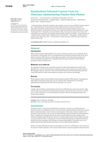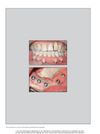7 citations,
July 2019 in “Animals” The KRTAP21-1 gene affects wool yield and can help improve wool production.
 2 citations,
May 2023 in “Nanomaterials”
2 citations,
May 2023 in “Nanomaterials” Microemulsions could improve skin drug delivery but face challenges like complex creation and potential toxicity.
 128 citations,
February 2016 in “British Journal of Dermatology”
128 citations,
February 2016 in “British Journal of Dermatology” Alopecia areata significantly lowers the quality of life, especially in emotional and mental health aspects.
 14 citations,
March 2022 in “Clinical Endocrinology”
14 citations,
March 2022 in “Clinical Endocrinology” The document concludes that a systematic approach is crucial to identify causes of androgen excess in women beyond the most common cause, Polycystic ovary syndrome (PCOS).
 2 citations,
December 2023 in “Current Pharmaceutical Biotechnology”
2 citations,
December 2023 in “Current Pharmaceutical Biotechnology” Nanocarriers can improve the effectiveness of herbal medicines in treating colorectal cancer.
 1 citations,
May 2023 in “European Journal of Human Genetics”
1 citations,
May 2023 in “European Journal of Human Genetics” Rare ULBP3 gene changes may raise the risk of Alopecia areata, a certain FAS gene deletion could cause a dysfunctional protein in an immune disorder, and having one copy of a specific genetic deletion is okay, but two copies cause sickle cell disease.
 18 citations,
January 2020 in “Journal of Clinical Research in Pediatric Endocrinology”
18 citations,
January 2020 in “Journal of Clinical Research in Pediatric Endocrinology” The document concludes that Functional Hypothalamic Amenorrhea should be carefully diagnosed and managed to prevent health complications, using lifestyle changes and specific medications.
 April 2016 in “Journal of The American Academy of Dermatology”
April 2016 in “Journal of The American Academy of Dermatology” Different treatments are effective for hair loss conditions, but results vary by individual factors.

A standardized consent form for PRP injections improves patient trust and legal protection.
 January 2015 in “Prace Naukowe Uniwersytetu Ekonomicznego we Wrocławiu”
January 2015 in “Prace Naukowe Uniwersytetu Ekonomicznego we Wrocławiu” Using Lasswell's model can make CSR communication more effective and trusted.
 3 citations,
April 2021 in “Journal of Medicinal Chemistry”
3 citations,
April 2021 in “Journal of Medicinal Chemistry” Finasteride may affect PNMT, causing side effects.
 3 citations,
March 2020 in “Dermatology Research and Practice”
3 citations,
March 2020 in “Dermatology Research and Practice” Tracnil™, a mix of myo-inositol, folic acid, and vitamin D3, safely reduced acne, improved excessive hair growth, and fixed irregular periods in overweight women with PCOS.
 8 citations,
May 2010 in “Dermatologic clinics”
8 citations,
May 2010 in “Dermatologic clinics” New treatments for skin conditions in children include a preferred drug for birthmark reduction, proactive creams for eczema and vitiligo, a safe psoriasis medication, and special tissues and socks for eczema and fungal infections.
 1 citations,
January 2023 in “Brazilian Journals Editora eBooks”
1 citations,
January 2023 in “Brazilian Journals Editora eBooks” Children's screen time increased during the pandemic, causing various health issues.
 August 2023 in “International journal of basic and clinical pharmacology”
August 2023 in “International journal of basic and clinical pharmacology” Herbal hair serum promotes natural hair growth and maintains healthy hair.
 January 2023 in “Mastology”
January 2023 in “Mastology” Hormone therapy for breast cancer often leads to sexual issues like vaginal dryness and decreased libido.
 June 2017 in “International Journal of Periodontics & Restorative Dentistry”
June 2017 in “International Journal of Periodontics & Restorative Dentistry” Using skin grafts from behind the ear for oral surgery in two patients with jaw injuries led to successful healing and good results.
 11 citations,
July 2020 in “Journal of Cosmetic Dermatology”
11 citations,
July 2020 in “Journal of Cosmetic Dermatology” Sandalore® improves hair growth and quality in people with hair loss.
 14 citations,
January 2015 in “ABCD”
14 citations,
January 2015 in “ABCD” The surgery effectively promoted and maintained weight loss in obese women during the first year.
 46 citations,
January 2020 in “Theranostics”
46 citations,
January 2020 in “Theranostics” Injecting a special gel with human protein particles can help hair grow.
 29 citations,
December 2019 in “Stem Cells Translational Medicine”
29 citations,
December 2019 in “Stem Cells Translational Medicine” Fully regenerating human hair follicles not yet achieved.
 January 2009 in “Bjog: An International Journal Of Obstetrics And Gynaecology”
January 2009 in “Bjog: An International Journal Of Obstetrics And Gynaecology” In 2009, there were new medical devices, treatments for gynecological conditions, updated health guidelines, and legal developments in women's health.
 1265 citations,
October 2013 in “The Journal of Clinical Endocrinology and Metabolism”
1265 citations,
October 2013 in “The Journal of Clinical Endocrinology and Metabolism” The guideline suggests using specific criteria to diagnose PCOS, recommends various treatments for its symptoms, and advises screening for related health issues.
 17 citations,
January 2013 in “Journal of Cosmetics, Dermatological Sciences and Applications”
17 citations,
January 2013 in “Journal of Cosmetics, Dermatological Sciences and Applications” 3D bioprinting could improve skin repair and treat conditions like vitiligo and alopecia by precisely placing cells.
 4 citations,
June 2013 in “The Journal of Rheumatology”
4 citations,
June 2013 in “The Journal of Rheumatology” The document concludes that various findings in rheumatology offer insights into disease severity, treatment responses, and potential risks in medication, with some limitations due to unspecified participant numbers.
 434 citations,
October 2003 in “PTR. Phytotherapy research/Phytotherapy research”
434 citations,
October 2003 in “PTR. Phytotherapy research/Phytotherapy research” Natural products in cosmetics are beneficial for skin and hair care with low toxicity.
 62 citations,
October 2010 in “Journal of biomedical nanotechnology”
62 citations,
October 2010 in “Journal of biomedical nanotechnology” Nanoparticles can enter the skin, potentially causing toxicity, especially in damaged skin.
 15 citations,
June 2014 in “Integrative cancer therapies”
15 citations,
June 2014 in “Integrative cancer therapies” Pranic meditation significantly improved mental health and quality of life for breast cancer survivors.
 16 citations,
March 2015 in “Clinical Cancer Research”
16 citations,
March 2015 in “Clinical Cancer Research” The document concludes that side effects from Smoothened inhibitor drugs for skin cancer are reversible and can be managed with a team approach to maintain quality of life.
 30 citations,
June 2019 in “Frontiers in Endocrinology”
30 citations,
June 2019 in “Frontiers in Endocrinology” The document concludes that managing non-classical congenital adrenal hyperplasia in females requires personalized treatment, genetic counseling, and a team of specialists.




























